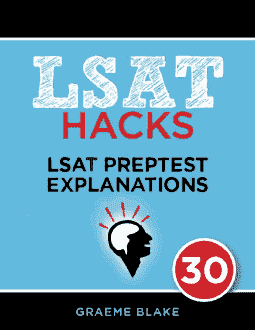QUESTION TEXT: Manuscripts written by first-time authors generally do…
QUESTION TYPE: Parallel Reasoning
CONCLUSION: My manuscript is unlikely to get much attention from publishers.
REASONING: First time authors who aren’t celebrities rarely get much attention for their manuscripts. I am a first time author who isn’t a celebrity.
ANALYSIS: This is a good argument. He might get publicity but probably won’t, based on the experience of authors like him.
There are actually three good arguments on this question so we have to be specific and match the argument exactly.
The stimulus has two conditions (not famous and first time publisher). It also has a premise that allows us to conclude “unlikely” and the argument actually does conclude “unlikely.”
___________
- This is a good argument but the structure is slightly different. The incumbent would have had to have been popular for this to be parallel. (the argument went from unlikely to possible instead of simply concluding unlikely as did the stimulus.)
- CORRECT. This is a good argument. A salad will probably be boring unless a certain thing happens. But that thing didn’t happen. So the salad will likely be boring.
- This is very close, but there is only one condition given: whether zoning is on the agenda. The stimulus and the correct answer have two conditions.
- This is a good argument but it has a different structure. It simply describes what will happen to the estate.
- This is a bad argument. It’s possible that something very abnormal happened this winter.


Here’s a break-down of the central premise of the stimulus:
If you’re a first-time author (FTA), you generally won’t get serious attention unless you happen to be a celebrity.
~Celebrity –> FTA generally won’t receive serious attention
So, the argument operates by negating the “unless” condition, i.e. “I’m a FTA and I’m not a celebrity, therefore my manuscript is unlikely to receive serious attention”.
That’s why the explanation says that the structure of (A) doesn’t match the stimulus. (A) doesn’t negate the unless condition, it affirms the unless condition: the incumbent in the election became very unpopular.
Here’s the central premise of (A):
Challenger generally wins elections –> incumbent has become very unpopular
incumbent NOT very unpopular –> challenger generally does NOT win
So, for the argument in (A) to match it’d need to also say something like: The incumbent has not become very unpopular, and therefore the challenger is unlikely to win.
If the degree of qualification of the conclusion in an answer choice (that is, whether a conclusion is likely, unlikely, probable, etc.) matches the degree in the stimulus, then that’s a good indicator it may be the right answer — but that’s not sufficient. The primary thing you should be looking for is if the overall structure matches. Saying something is “unlikely” on the LSAT means that there’s a greater than 50% chance of that outcome not happening, and saying something is “probable” means that there’s a greater than 50% chance of that outcome happening. So, in a way these terms do parallel each other because something being “unlikely” means that it “probably” won’t happen.
Greame, the criteria you give for A being wrong is based on the structure; “the argument went from unlikely to possible instead of simply concluding unlikely as did the stimulus.” But the correct answer B also doesn’t conclude unlikely; is it thus sufficient to declare parallel reasoning between “unlikely, unlikely” and “probably, probably” (answer B), and thus this argument is more parallel than the one (answer A) that claims “unlikely, probably”?
Hi Graeme,
I’m not sure answer choice is (a) is a good argument? (I assume you mean valid when you wrote good btw)
I mapped it as follows:
challenger wins –> not (incumbent popular)
not(incumbent popular)
—————
challenger wins
Anyways, thanks for the great resource your site provides! Take care.
They said the challenger may win, which means it’s possible. That is true, as far as we know, since the necessary condition (“unpopular”) was fulfilled.